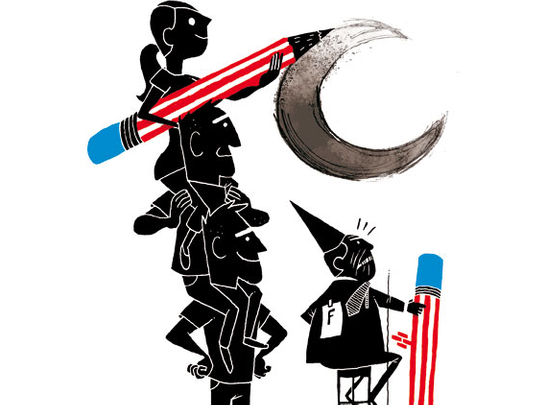
The idea that politicians are wont to say stupid, destructive and wilfully ignorant things should not, in and of itself, be unusual. But an argument can be made that what we have witnessed over the last few weeks in the United States is something of a different order.
The vitriol-fuelled debate surrounding the Islamic community centre popularly (and inaccurately) known as the ‘Ground Zero Mosque' has been extraordinary even by the hyper-partisan standards of recent American politics.
The opportunistic bigotry of many on the political right (and not a few on the political left) was neatly summed up last week by Florida congressional candidate Ron McNeil, who told a room filled with high school students that he was against the project because "it was the Muslim religion that caused the problems we had on 9/11".
Now the good news: voices like these may have grabbed most of the headlines in this debate, but they are not the only ones out there. Indeed, pushback has often come from seemingly unlikely places. After McNeil made those remarks an incredulous teenager stood up to challenge him.
"What gives you the right, or the federal government the right, to tell an American that they cannot build an institution or a building in a certain place?" the student asked.
"That religion is against everything America stands for: freedom and liberty," McNeil replied. "When you've got something that calls itself a religion but its plan is to destroy our way of life, you've got to think differently about it."
At that point the teen went from quizzical to indignant. Refusing to cede the microphone he told the candidate: "Where is it our place to tell them that they're wrong and that their religion is bad? It's not our place as Christians, I would think."
We need to applaud that student's open-mindedness, even as we ask where ignorance like McNeils comes from. In the midst of the ground zero furore the results of a recent poll released by the widely respected Pew Forum on Religion and Public Life may offer a clue.
Astonishing ignorance
That survey showed that 18 per cent of Americans believe President Barack Obama to be a Muslim, a figure that has risen by seven percentage points since he took office last year. Among Republicans the figure is much higher — more than one-third. In addition, a striking 43 per cent of all respondents say they do not know whether Obama is a Muslim, a Christian or something else.
Those numbers have been widely chewed over in the United States since they were released last week. Obama, after all, has written eloquently about his Christian faith in two best-selling books. In 2008, his membership in a church headed by a pastor given to racially inflammatory sermons became a potent campaign issue.
One might have thought that people angry about the church Obama used to attend would at least acknowledge that, as a regular churchgoer, he is highly unlikely to be a Muslim. Apparently not.
But even that discussion misses a more basic point:
Even if Obama were a Muslim why should that matter in America, a republic that prides itself on its history of religious freedom?
The answer is that it shouldn't — and someday it won't. Unfortunately that day may be slow in coming. America has always been a country that prides itself on its ability to assimilate outsiders, but that process has tended to be slower, and more contentious, than most Americans like to admit.
Rest assured, however, things do change. When John F. Kennedy ran for president in 1960 many Americans — Democrats and Republicans alike — believed that as a Catholic he would take orders from the Pope.
Kennedy had to work throughout the campaign to calm those fears and, even so, won the White House by only the slimmest of margins. But the next time a Catholic was nominated for the presidency (John Kerry in 2004) the fact that he was Catholic barely registered with the public.
If that example seems a bit remote — and 44 years a long time to wait — then consider this: in 2006 the election of America's first Muslim congressman, Keith Ellison of Minnesota, made headlines all over the country. When a second Muslim, Indiana's André Carson, won a congressional seat in 2008 hardly anyone seemed to notice.
Over time the impossible becomes the merely remarkable. The remarkable, in turn, becomes commonplace. Little consolation, perhaps, to trailblazers like Obama or the organisers behind Manhattan's Muslim Community Centre, but a reminder that America, for all its faults, still has a great capacity for self-correction.
Gordon Robison, a writer and commentator who has lived in and reported on the Middle East for two decades, teaches political science at the University of Vermont.











